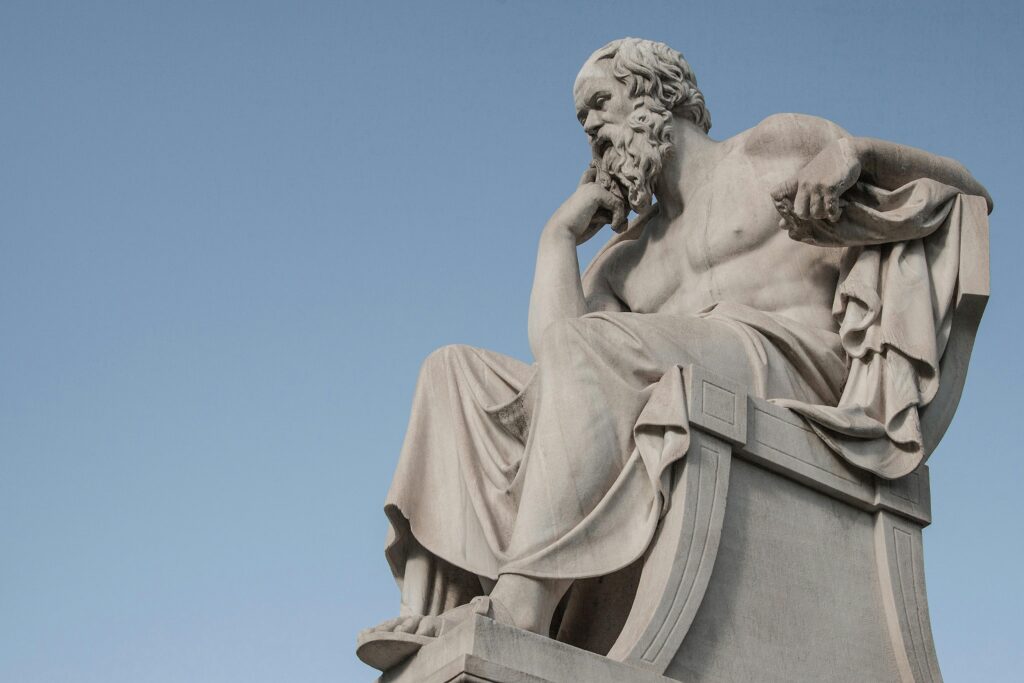The History of Self-Help wasn’t found in some book or a lecturer on some stage; it was thought.
The roots of self-help stretch back to antiquity, roughly about 2500 years ago. Ancient civilizations were deeply concerned with self-mastery, moral development, and the pursuit of a good life. And who wouldn’t be? The mystery of the world is fascinating but so scary as people always seek an answer and feel uncomfortable when they don’t find one.
- Ancient Egypt and Mesopotamia offered proverbs and moral instruction on how to live well within society. People like Ptahhotep and Ahikar are some of the most ancient thinkers.
- Greece and Rome took things further. Socrates’ famous dictum, “Know thyself,” became the foundation of Western introspection. Stoics like Epictetus y Marcus Aurelius preached self-discipline, resilience, and inner peace, all of which still echo in modern self-help. Indeed, temptations is in every stoic’s closet
- In India, Hindu and Buddhist traditions emphasized self-realization, detachment from desire, and mental discipline—teachings that continue to influence mindfulness and spiritual self-help literature today.
- Confucius in China, around the 6th century BCE, emphasized ethical behavior, self-cultivation, and education as a lifelong responsibility.

“Know Thyself”
Religion as Self-Help
Religious texts are often, in essence, self-help manuals wrapped in divine narrative and supernatural phenomenon. The Bible, Quran, and other scriptures are full of exhortations on how to live righteously, avoid sin, build character, and find meaning. Gives wisdom to even those that are non religious too. Luckily, good advice is universal. The bible quite literally has a whole chapter about proverbs.
The medieval and early modern eras emphasized moral instruction through sermons, parables, and spiritual exercises. Think of St. Augustine’s Confessions—a work of intense personal reflection—or Ignatius of Loyola’s Spiritual Exercises, a structured program for personal growth and discipline.
These were less about worldly success and more about eternal salvation—but they shared a core principle with modern self-help: transformation of the self for the better.
The Enlightenment and the Rise of Rational Self-Improvement
As Western societies shifted toward reason and individualism during the Enlightenment, so did approaches to self-improvement.
- Benjamin Franklin, in the 18th century, is often considered one of the founding fathers of self-help. His Autobiography detailed his personal regimen for moral and intellectual betterment—a blueprint for the self-made man.
- The Industrial Revolution created new social mobility—and with it, a greater hunger for guidance on personal success. Books began to appear offering advice on etiquette, business acumen, and social conduct.
The Birth of the Modern Self-Help Genre
The phrase “self-help” was popularized by Samuel Smiles in his 1859 book Self-Help, which emphasized thrift, character, and perseverance. Smiles saw personal virtue—not government or luck—as the path to success. His work was a direct response to the upheaval and opportunity of industrial society.
In the 20th century, self-help began to align with psychology:
- Dale Carnegie’s How to Win Friends and Influence People (1936) marked a turning point, blending practical advice with emotional intelligence and communication skills.
- Norman Vincent Peale’s The Power of Positive Thinking (1952) spiritualized optimism, laying the groundwork for the “law of attraction” movement.
- Napoleon Hill’s Think and Grow Rich (1937) tied belief, visualization, and ambition directly to material success.
The explosion of mass media in the 20th century—radio, TV, and eventually the internet—gave self-help gurus an ever-larger audience. By the late 20th century, figures like Tony Robbins, Stephen Coveyy Deepak Chopra were household names.
Think of the now retro educational informortials that the 50s have done to showcase how everyday people can improve their everyday lives through everyday ways
Self-Help in the Digital Age
Today, self-help is everywhere—YouTube channels, Instagram quotes, podcasts, apps, TED Talks. The genre has split into dozens of niches: productivity, mental health, fitness, dating, spirituality, financial independence. Anyone with a camera or keyboard can be a guru.
The market reflects this: the global self-help industry is estimated to be worth over $40 billion and growing.
Yet criticism remains. Detractors argue that self-help often oversimplifies deep problems with vagueness and shifts responsibility onto the individual, or sells feel-good platitudes. Others point out that much of the advice is recycled, unscientific, or overly commodified. And why wouldn’t it be? Great men had thought about these things way before, and all we get now is a regurgitation.

The Enduring Appeal
Despite this, the desire to grow, change, and overcome adversity is a constant of the human condition. What began as moral philosophy has become a cultural juggernaut. At its best, self-help provides clarity, structure, and hope. At its worst, it becomes snake oil. If anything, it depends if you believe in it, even if that is a lie.
Ultimately, self-help is not just about helping yourself—it’s about shaping the person you want to become.
And that’s a quest as old as civilization.

